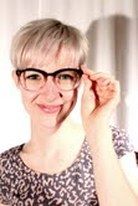Halifax Media Co-op
News from Nova Scotia's Grassroots
Right Queer
By Rebecca Rose
The first time I remember hearing the word queer was in my nanny’s smoky basement apartment.
You see, my dad’s mother was born and raised in Reserve Mines, one of 18 children. Long after she moved to the mainland to live with my aunt, her Glace Bay accent and vernacular stayed put. It was never just “Jesus”, but always “Jesus Mary and Joseph” and I don’t think I ever heard my nanny, or her siblings, pronounce the “t” at the end of the word what, ever.
My Nanny used queer as a descriptor for just about any inanimate object (“pass that queer thing over there”) or person (“he’s a queer one”). In the first case it was used when a word escaped you, it could be a stand in for the salt, a lamp or the remote control. In the second case it was used in the more Oxford Dictionary sense of the word; it meant strange, different, a little bit off. My mother’s mother in Sydney referred to people as “a queer little duck”.
There was nothing strange about the word queer in my family, it had no negative connotations, and it definitely wasn’t used in the sexual orientation or gender identity sense of the word. It wasn’t until me and my cousin’s were quite a bit older that my Nanny’s “queer “ prompted giggles.
I don’t remember when I started using the word queer to describe myself. I moved to Toronto when I was 17, shortly after coming out as bisexual to my close friends, to attend Ryerson University, which was a block away from Toronto’s gaybourhood. First semester I spent my between class time in the RyePride office, an old janitor’s closet on the third floor of our library building (their tagline was ‘come out of your closet and into ours’) sitting on the black, pleather couches, talking to folks who had way more practice at this being gay thing than I did.
At the time, bisexual seemed to be the only word for someone like me who was interested in both men and women. Although I was solely in relationships with non-trans men, I clung tightly to the term and the identity, buying and reading every issue of bi zine “The Fence”, sporting a bi-pride pin and defending both the term and my identity to friends who insisted by bisexuality either didn’t exist or was just a phase (some joked I was a “BUG”, bisexual until graduation). It was in my fifth year in Toronto when I realized that I wasn’t much interested in dating non-trans men anymore. Bisexual no longer felt comfortable for me, but neither did lesbian or gay.
At first, I saw queer simply as an umbrella term. A word that eliminated the need to use the ever growing “LGBTQI*” acronym and that was far more flexible than gay or lesbian and didn’t erase my past heterosexual relationships. Later I began to appreciate the radical or political nature of the word queer; that it was reclaimed from it’s days as a slur used against queer and trans folks. A feminist, I had learned about the power of reclaiming words like “cunt” from Inga Muscio and “bitch” from my favourite magazine of the same name. By taking these words back and using them in a positive or empowering way, we ensure that they can no longer be used to hurt us.
“Queer” has also grown with me. As someone who also dates trans men, lesbian wouldn’t have worked for me. Queer validates my sexual identity, while acknowledging that I’m not just interested in the ladies.
When I first started using the word queer around my parents, they were taken aback. “We can use that now?” my father asked. My parents grew up in 1950’s, 60’s Cape Breton. Queer was either used in my Nanny’s sense of the word or as a slur. Just recently my father asked me to again explain what queer meant to me. He listened, asked questions and then said, “I still don’t get that stuff.” But he’s trying. He now uses “queer” in conversations with me when referring to my sexual identity, which is pretty rad for a straight retired businessman in his late 50’s.
Recently I was leafing through a little book of Cape Breton sayings, and there were at least three that used queer, in my nanny’s sense of the word. For me, the word queer not only links me to the wider LGBTQI* community, but it also links me to my Cape Breton roots, two equally important aspects of my identity.
Rebecca Rose is a social activist involved with the queer and feminist communities in Nova Scotia. Originally from Sydney she now resides in Halifax. She is one of the organizers of the Halifax Dyke and Trans March http://www.facebook.com/HalifaxDykeTransMarch. Rebecca also works with university and college students and is passionate about achieving a system of well-funded, accessible and equitable post-secondary education.
This blog was originally published on Coastal Braid.
The site for the Halifax local of The Media Co-op has been archived and will no longer be updated. Please visit the main Media Co-op website to learn more about the organization.



